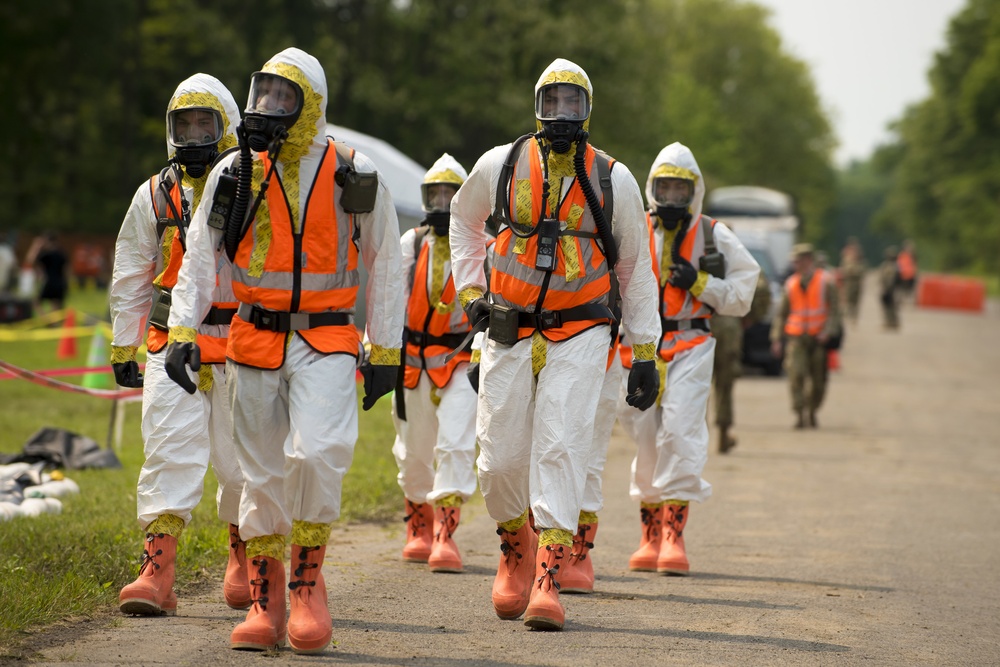Opportunity to Reform the Department of Homeland Security’s Biodefense Operations and Governance
Congress can strengthen the Department of Homeland Security’s ability to manage its biodefense responsibilities by taking action now.

Published by The Lawfare Institute
in Cooperation With

The present moment is ripe to reform biodefense efforts concerning homeland security. First, the coronavirus pandemic and the war in Ukraine demonstrate both the actual harms and potentially devastating consequences of biological events. The sluggish initial U.S. response to the pandemic revealed the inadequacy of detection and mitigation measures embedded in federal government policies and practices. And given substantial debate regarding Russia’s biological weapons program and its suspected use of chemical weapons against its adversaries, the potential for the accidental or intentional release of biological agents exists in the present environment. Moreover, if Russia were to engage in biological warfare against Ukraine, that act could embolden other countries to develop and use such weapons in other conflicts.
Second, as a practical matter, despite political rhetoric surrounding border security and immigration issues, the 117th Congress is invested and engaged—often in a bipartisan manner—in efforts to improve homeland security and reform the Department of Homeland Security (DHS). In the House of Representatives, the Committee on Homeland Security has voted out many bipartisan bills focused on improving homeland security and the department’s functioning. The House passed more than 35 bills in the past year covering a wide range of homeland security issues, such as terrorism, cybersecurity, transportation security, grantmaking, intelligence sharing and human trafficking. The House Committee on Homeland Security held a hearing in June 2021 that featured testimony from experts at four think tanks (including one of the authors, Carrie Cordero) who have provided recommendations to update the department’s mission and improve oversight and accountability. The Senate Committee on Homeland Security and Governmental Affairs has also been engaged, with over 50 bills introduced on similar issues, among them sustained legislative attention to emergency response and disaster management.
These committees should include among these efforts attention to DHS’s role in biodefense. Biological threats can present naturally, accidentally or intentionally. In February, the Senate Committee on Homeland Security and Governmental Affairs held a hearing on Addressing Gaps in America’s Biosecurity Preparedness. All but one of the operational agencies within DHS carry some biodefense responsibilities. Asha George explained in congressional testimony at this hearing that these entities—the Federal Emergency Management Agency, U.S. Customs and Border Protection, the Transportation Security Administration, the U.S. Coast Guard, the U.S. Secret Service, U.S. Immigration and Customs Enforcement, the Federal Law Enforcement Training Centers and the Cybersecurity and Infrastructure Security Agency—all have operational, advisory or grantmaking responsibilities for biodefense. Among the DHS headquarters elements, the Science and Technology Directorate, the Countering Weapons of Mass Destruction Office (CWMD), and the Office of Operations Coordination also work to defend the homeland against biological threats. Unfortunately, these many contributions to national biodefense are neither coordinated nor overseen to ensure effectiveness and efficiency across the department.
As the Bipartisan Commission on Biodefense (of which George serves as executive director) has researched and reported on, the DHS BioWatch system does not perform as intended, in that it does not detect the biological agents for which it was designed. Although the DHS Fiscal Year 2023 Budget-in-Brief states that “[t]he CWMD BioWatch program gives warning of an airborne bioterrorist attack in over 30 major metropolitan areas across the United States in time to save lives[,]” the commission and the Government Accountability Office (GAO) have reported to the contrary. As the commission’s 2021 report “Saving Sisyphus: Advanced Biodetection for the 21st Century” states, “DHS spends nearly $80 million a year on this program but has never been able to consistently demonstrate its operational capability in the field.” And a March 2021 GAO report described that “BioWatch has not reassessed its strategic posture to have nationwide coverage since its inception in 2003.” The system is built on outdated technology that was not capable of performing when it was developed more than 20 years ago, and it has not demonstrated competency since. As the commission has observed, “BioWatch was not designed to track naturally occurring, emerging infectious diseases. Biodetection technology does exist, however, that could have detected diseases like the 2019 novel coronavirus disease (COVID-19) in the environment.”
GAO and the commission further reported that Biodetection for the 21st Century (BD21), the department’s acquisition program launched in 2018 to replace BioWatch, has yet to obtain new technology. Leadership in the department itself has been so dismayed that they have paused the BD21 program numerous times. The situation remains mired in fear of losing budgets and personnel, while other departments and agencies (such as the Department of Defense and the National Aeronautics and Space Administration), as well as industry, produce functioning biodetectors. According to the DHS inspector general’s 2021 report on BioWatch, “Without implementing changes to address BioWatch’s challenges, the United States’ ability to prepare, detect, and respond to a potential bioterrorism attack is impeded, which could result in significant loss of human life.” The United States needs a biodetection system, but clearly Congress must help DHS obtain the biodetectors and other equipment it needs. Eighteen years is long enough to wait for success. It’s time to move on.
The Bipartisan Commission on Biodefense has made about 200 recommendations in its written reports over the past six years that would, if acted upon, strengthen the nation’s defenses against biological threats. The legislative and executive branches of government have taken up many of these, including a recommendation from the commission’s 2015 National Blueprint for Biodefense to develop a National Biodefense Strategy. The Trump administration issued this strategy in 2018. The Biden administration is updating the strategy with a more robust implementation plan. But Congress can strengthen DHS’s ability to manage its biodefense responsibilities now. To start, Congress can take three steps: create a biodefense leadership position within DHS, eliminate appropriations for nonfunctioning programs, and revise and update the legislative mandate for CWMD.
Leadership
Congress should amend the Homeland Security Act of 2002 to create an assistant secretary for biodefense position within the DHS Office of Strategy, Policy, and Plans. This leadership position should:
- understand how all DHS operational components and headquarters elements contribute to biodefense;
- coordinate biodefense policy development across all operational components and headquarters elements;
- coordinate the implementation of the department’s various biodefense responsibilities across all operational components and headquarters elements;
- serve as the senior adviser to the secretary of homeland security and heads of all operational components on all biodefense matters with the respect to the department specifically and homeland security broadly; and
- serve as the primary point of connection to the National Security Council, Domestic Policy Council, National Economic Council and Office of Science and Technology Policy for biodefense.
CWMD does not currently serve this role, as it does not have the mission, authority, knowledge or staffing needed to execute the department’s full responsibilities as they relate to biodefense. As written, the statute simply directs CWMD to engage in limited chemical, biological, radiological and nuclear domestic detection activities.
Appropriations
Congress should eliminate funding for BioWatch. As the commission’s report recommends, “Congressional appropriators should deny further funding for BioWatch activities until proven replacement technology is identified and confirmed to meet the needs of the program.” Instead, Congress should support the commission’s substantial recommendation that Congress invest $10 billion per year for 10 years in science and technology research for biodefense, and reallocate the $80 million currently dedicated to BioWatch to support biodetection research. DHS is unlikely to unilaterally shutter this program without a congressional mandate to do so. Recent appropriations language suggests that Congress is willing to support BD21 and its effort to acquire replacement technology for BioWatch but wants to see evidence of progress.
Legislative Authorities
Congress should amend the legislation that authorizes CWMD, which sunsets in 2023. Presuming that Congress intends to renew the existence of CWMD, the authorities for this headquarters element—which recently moved its physical location to DHS headquarters—are inadequate. The legislation for this office amounts to a small statutory note, indicating that wherever the word “nuclear” appeared in the original law, it should be understood to mean “biological and chemical” as well. Congress should decide whether CWMD should solely detect domestic chemical, biological, radiological and nuclear threats (an original vision for the office more than a decade ago); try to acquire new technologies and manage the development of material threat determinations and assessments independent of the DHS Science and Technology Directorate; conduct WMD intelligence analysis and dissemination independent of the DHS Office of Intelligence and Analysis; and field domestic nuclear detectors in ports independent of the U.S. Customs and Border Protection and U.S. Coast Guard. While Congress is at it, it should rename the office, considering it does not currently work to counter all types of WMD.
Today’s biological threats show no signs of desisting any time soon. Naturally occurring outbreaks, epidemics and pandemics are occurring at an increasing rate (with COVID-19 and avian influenza currently occurring simultaneously here in the United States) and deaths due to COVID-19 reaching 1 million in the United States in just over two years. Laboratory accidents continue to occur in the United States and throughout the world, while the number of high-containment laboratories and amount of dangerous research continues to increase unabated. The U.S. Department of State reported in 2021 that Russia and North Korea possess active offensive biological weapons programs. China and Iran may not be far behind, although definitive recent assessments are difficult to come by. Terrorist organizations continue to seek biological agents and weapons and have in the past encouraged their members to use them to terrorize, sicken and kill those they consider enemies. DHS, as chief among those federal departments and agencies responsible for securing the homeland, must overcome its current state of fractionation and demonstrate to the rest of the government, country, and world that it is capable of coordinating and leading efforts in biodefense and other arenas. By acting on the recommendations above, Congress can provide the pathway to do so.



.jpg?sfvrsn=e915b36f_5)


